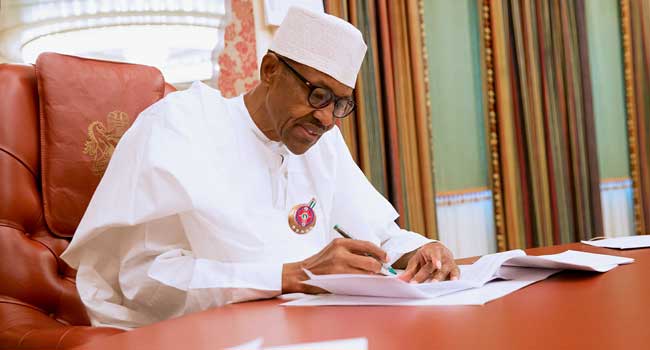…demands update on petrol smuggling
President Muhammadu Buhari has thrown out claims by the Nigerian National Petroleum Corporation (NNPC) that a surge in smuggling of premium motor spirit (PMS) popularly known as petrol, was responsible for N774 million fuel subsidy incur daily, New Telegraph has learnt
The president, a source at the Presidency told this newspaper in Abuja last weekend, was particularly enraged by the embarrassment the claims had caused government and an immediate update on inter-agency collaboration between NNPC and the Nigerian Customs on the claims had been ordered. Chief Operating Officer, Downstream, NNPC, Henry Ikemefuna Obih, an engineer, confirmed to this newspaper on the sideline of a conference in Abuja, saying the “president did not want to hear this argument at all.”
Group Managing Director of NNPC, Dr. Maikanti Baru, had earlier declared that the country was losing volumes of petrol to smuggling across the border, just as he decried proliferation of fuel stations in border towns.
The subsidy being paid by NNPC to keep the pump price of petrol at N145 per litre has hit N774 million per day, Baru hinted, maintaining that the rise was due to abnormal consumption of petrol from less than 35 million litres per day to about 80 million litres per day. Describing it as petrol consumption under-recovery, Baru said that the N774 million daily payments is denying Nigerians the “benefit of the Federal Government’s benevolence of keeping a fixed retail price of N145 per litre despite the increase in PMS open market price above N171 per litre.”
President Muhammadu Buhari did not, however, buy into this. “He did not want to hear about this (claim) at all. He actually asked us to rather work with the Customs instead of going to town with the news he considers demeaning to the administration,” Obih said.
“Or how do you describe the effect of claims by NNPC, a corporation under the control of government, that the porosity of borders expected to be manned by customs, another agency of government, has led to a surge in smuggling of premium motor spirit (PMS) known as petrol. It does not sound well and, in fact, it is an indictment on the competence of government as a whole,” the Presidency source added
Besides, Obih had said that his Corporation had also been mandated by the National Executive Council (NEC) to work with the World Bank and Ministry of Finance to determine the actual daily consumption of the product in the country. Nigeria had solely depended on importation of petrol due to gross inefficiency of four of her refineries.
The revelation that the country lacks knowledge of accurate figure of its daily fuel consumption casts doubts on government’s sincerity on efforts to get rid of sleaze in the downstream sector. Stating that the only data the Corporation has accurate knowledge of its truck out figure, Obih struggled to make Nigerians believe that this truck out figure surged from 48 million litres daily in 2016 to 50 million litres per day in 2017. He could not substantiate thi
“A study is being commissioned to know the actual number of litres we consume on daily basis. I am sure by the time the study is done, we will be able to provide an answer to the question on accurate number of PMS consumption in the country,” he said. It would be recalled that the state-owned oil firm raised the alarm on the proliferation of fuel stations in communities with international land and coastal borders across the country, maintaining that the development had energised unprecedented crossborder smuggling of petrol to neighbouring countries.
“This is making it difficult to sanitise the fuel supply and distribution matrix in the country,” Baru said when he led a top management team of the Corporation on a visit to the Comptroller General of the Nigerian Customs Service, Col. Hameed Ali (rtd) on March 4, 2018. Baru claimed, according to a statement made available then by Group General Manager, Group Public Affairs Division, that detailed study conducted by NNPC indicated strong correlation between the presence of the frontier stations and the activities of fuel smuggling syndicates.
He alleged that the activities of the smugglers had led to recent observed abnormal surge in the evacuation of petrol from less than 35 million litres per day to over 60 million litres per day, which is in sharp contrast with established national consumption pattern. Daily evacuation of petrol varies in recent past months, ranging from 35 million litres per day to 60 million litres per day and even to as high as 80 million litres per day as at December last year.
It is now settling at an average of 50 million litres per day, Ndu Ughamadu, Group General Manager, Group Public Affairs Division, said when this newspaper called him for clarification on the exact consumption figure.
According to NNPC, “providing a detailed presentation of the findings, the NNPC GMD informed that 16 states, having amongst them 61 local government areas (LGAs) with border communities, account for 2,201 registered fuel stations. “The fuel tank had a combined capacity of 144,998,700 litres of petrol. Eight states, with coastal border communities spread across 24 LGAs amongst the states, account for 866 registered fuel outlets with combined petrol tank capacity of 73,443,086 litres.”
.new telegraph
















